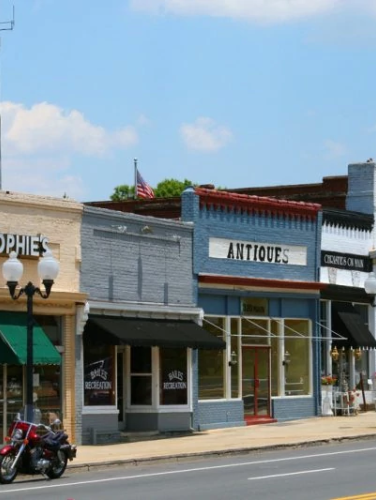
Pineville Commercial Block
(ca. 1910s)
Pineville’s Main Street commercial corridor served as the economic backbone and social center for Pineville residents for much of the twentieth century.
312 - 330 Main St., Pineville, NC 28134
For more than a century, Pineville’s Main Street has been lined with the businesses and homes of the town’s commercial, political, and civic elite. Families such as the Yandells, Yountses, and Millers began commercial development of the town shortly after the turn of the twentieth century. While doing do so, they also built the churches, schools, and recreation spaces that turned the once clustered collection of log cabins at the intersection of two trading paths to a thriving early twentieth century commercial center. Initially dependent upon the cultivation, ginning, and milling of cotton, the town’s economy expanded such that, by the 1930s, Main Street boasted five grocery stores, two barbershops, a dime store, drugstore, doctor’s office, blacksmith, livery stable, pool room, post office, movie theater, and funeral home. Many other Mecklenburg County town centers, once similar to Pineville’s Main Street, no longer exist. The buildings along Main Street are now rare and significant artifacts that can tell us much about the town and its culture, history, architecture, and residents. They encompass the distinctive characteristics of type, period, and method of construction once prevalent in the small towns of Mecklenburg County and serve as a physical reminder of the commercial past of the town and the region.
Property Quick Links
Pineville had its commercial beginnings as a train stop when the South Carolina Railroad opened a depot in 1852. Incorporated in 1873, the town became a busy center for agricultural support and textiles in the next few decades, including the 1894 opening of the Dover Yarn Mill. By 1902, twenty-five percent of the town’s nearly 700 residents were employed at the mill. Those not employed by the mill labored primarily as cotton farmers. Autumn would bring farmers to Main Street where they would form long lines to have their cotton ginned. Saturdays would also bring farmers to town to shop, conduct business, and socialize. Into the 1930s, Pineville’s only paved streets were Main Street and Polk Street. Trips to uptown Charlotte, already rare in the 1930s, became even more so during World War II when gas became rationed, leaving most people who lived in or near Pineville to shop on Main Street.
For much of the twentieth century, local businessman W.A. Yandell owned every property on the south side of Main Street, most of which he leased to other businesses. Yandell also ran a hotel and general store at 331 Main Street. The brothers Leightner and J.R. Miller owned much of the north side of Main Street dating back to the early 1920s. The brothers were among Pineville’s wealthiest men and largest farmers. They also owned the town’s cotton gin, and both served terms on the Pineville Board of Alderman during the 1930s and 1940s.

